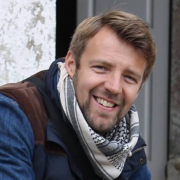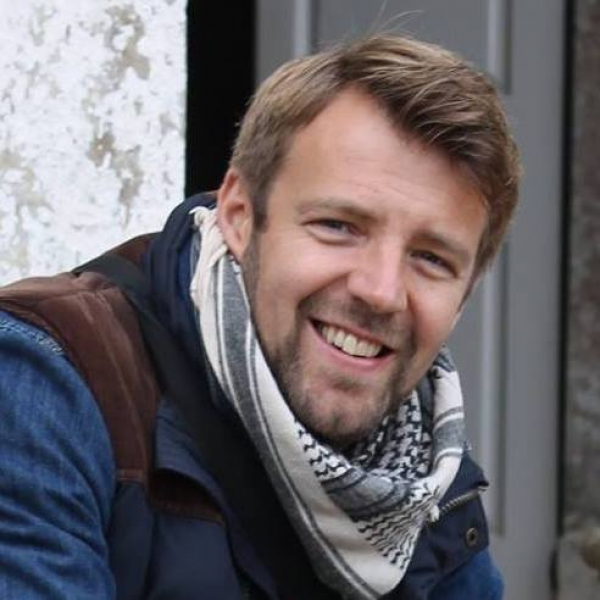Dr Paweł Surowiec-Capell
School of Journalism, Media and Communication
Senior Lecturer in Public Relations and Strategic Communication


+44 114 222 2523
Full contact details
School of Journalism, Media and Communication
C632
The Wave
2 Whitham Road
Sheffield
S10 2AH
- Profile
-
Paweł joined the University of Sheffield’s School of Journalism, Media and Communication in April 2019 as Senior Lecturer in Strategic Communication. Previously, he worked at Bournemouth University (2006–2019) and acted as research fellow at the Charles University in Prague (2014–2016). His work focuses on the interplay of traditional news and digital media with persuasion in international politics, particularly on relationships between European politics, hybrid media landscapes and strategic communication.
Paweł authored Nation Branding, Public Relations and Soft Power: Corporatising Poland (2016). He has co-edited Social Media and Politics in Central and Eastern Europe (2017) as well as Public Diplomacy and the Politics of Uncertainty (2021). He is currently working on a volume exploring Hybridisation of Power in International Politics.
Apart from academic work, Paweł enjoys running, skiing and music: he is a follower of the FIS Alpine Ski World Cup and likes to listen to music of Fryderyk Chopin and Polish jazz.
- Publications
-
Books
- Public Diplomacy and Politics of Uncertainty. Cham: Palgrave MacMillan.


- Social Media and Politics in Central and Eastern Europe. New York: Routledge.


- Nation Branding, Public Relations and Soft Power: Corporatising Poland. Abingdon: Routledge.


Journal articles
- Between Europeanisation and corporatisation : Poland’s nation branding and soft power for public consumption. East European Politics and Societies: and Cultures, 35(4), 1090-1112.


- The populist style and public diplomacy : kayfabe as performative agonism in Trump’s twitter posts. Public Relations Inquiry, 10(1), 5-30. View this article in WRRO


- Hybridity and soft power statecraft: The 'GREAT' campaign. Diplomacy and Statecraft, 31(1), 168-195. View this article in WRRO


- Introduction : media and illiberal democracy in Central and Eastern Europe. East European Politics, 36(1), 1-8.


- Towards illiberal conditioning? New politics of media regulations in Poland (2015–2018). East European Politics, 36(1), 27-43. View this article in WRRO


- Facebook as an instrument of election campaigning and voters’ engagement: comparing Czechia and Poland. European Journal of Communication, 34(2), 121-141. View this article in WRRO


- Re-visiting ‘Solidarność’: Propaganda of protest and campaigning of the social movement. Communication, Culture and Critique, 11(4), 622-641. View this article in WRRO


- Post-truth soft power: changing facets of propaganda, kompromat, and democracy. Georgetown Journal of International Affairs, 18(3), 21-27.


- Poland’s 2011 online election campaign: new tools, new professionalism, new ways to win votes. Journal of Information Technology & Politics, 11(2), 186-205.


Chapters
- Diplomacy and digital propaganda In Bjola C & Manor I (Ed.), The Oxford handbook of digital diplomacy (pp. 212-231). Oxford: Oxford University Press.


- Hybridity, soft power, and statecraft: ontological mapping In Chitty N, Ji L & Rawnsley G (Ed.), Routledge handbook of soft power (pp. 117-129). London: Routledge.


- Media, public diplomacy and illiberalism In Laruelle M (Ed.), Conversations on illiberalism (pp. 84-88). Washington D.C.: George Washington University.


- Strategic communications and public diplomacy In Spry D (Ed.), The ASEF public diplomacy handbook: communicating with purpose and value (pp. 23-34). Singapore: Asia-Europe Foundation.


- Introduction: certainty of uncertainty and public diplomacy In Surowiec P & Manor I (Ed.), Public diplomacy and the politics of uncertainty (pp. IX-XXVII). Cham: Palgrave MacMillan.


- Conclusions In Surowiec P & Manor I (Ed.), Public diplomacy and the politics of uncertainty (pp. 329-342). Cham: Palgrave MacMillan.


- Content analysis and the examination of digital propaganda In Baines P, O’Shaughnessy N & Snow N (Ed.), The Sage handbook of propaganda (pp. 171-188). London: Sage Publications.


- Branding Poland online: propagating and resisting nation branding on Facebook In Surowiec P & Štětka V (Ed.), Social media and politics in Central and Eastern Europe (pp. 160-181).


- Introduction: social media, politics and democracy in the post-transition Central and Eastern Europe In Surowiec P & Štětka V (Ed.), Social media and politics in Central and Eastern Europe (pp. 1-20). London: Routledge.


- Conclusions In Surowiec P & Štětka P (Ed.), Social media and politics in Central and Eastern Europe (pp. 198-204). London: Routledge.


- Crisis communication research in Central and Eastern Europe In Löffelholz M, Seeger M & Auer C (Ed.), The handbook of international crisis communication research (pp. 384-396). Oxford: Wiley-Blackwell.


- The use of the web for political participation In Charles A (Ed.), Media/democracy: a comparative study. Cambridge: Cambridge Scholars Publishing (pp. 81-102). Cambridge: Cambridge Scholars Publishing.


- Towards corpo-nationalism: Poland as a brand In Kaneva N (Ed.), Branding post-communist nations: marketizing national identities in ‘new’ Europe (pp. 124-144). New York: Routledge.


Book reviews
- Poland’s New Ways of Public Diplomacy. ERIS – European Review of International Studies, 5(2), 108-112.


- Public relations in global cultural contexts: multi-paradigmatic perspectives. Corporate Communications: An International Journal, 4(17), 514-516.


- Public Diplomacy and Politics of Uncertainty. Cham: Palgrave MacMillan.
- Teaching interests
-
Paweł is intrigued by questions relating to the colonisation of propaganda and disinformation to new social spaces, and the reinvention of this practice, particularly in the context of diplomacy in hybrid media landscapes (e.g. digital diplomacy, cyber diplomacy). He merges these research interests with lecturing, public engagements and consultancy work. His interests focus on European and US politics.
- Teaching activities
-
Pawel is convenor for the modules JNL6303 Introduction to Political Communication, JNL401 Soft Power and Public Diplomacy as well as JNL233 Journalism and Political Communication. He also oversees dissertation work by students on MA Global Journalism (JNL6133) and MA International Public and Political Communication (JNL6300).
Between 2011 and 2016, Paweł acted as a visiting scholar at Sorbonne IV (CELSA) in Paris. He taught at universities in Poland, Israel, Sweden, Italy and New Zealand. He supervises, mentors and examines doctoral work in the UK and overseas.
- Professional activities and memberships
-
Paweł has previously appeared on ITV News, Czech Public Radio, Le Droit de Vivre, TVN24, and Chunichi Shimbun. He engages in professional publishing for outlets such as Brief, Convergences, The Conversation, Visegrad Insight, and the Centre for Public Diplomacy Blog. His work informs policy reports including the EU’s European Committee of the Regions. Representing Britain, he is an active member of the steering committee for the Belvedere Forum (by the Chatham House and the Polish Institute of Royal Affairs). Paweł trained diplomats, public diplomats and strategic communicators for the Asia-Europe Foundation and the Polish Ministry of Foreign Affairs and delivered talks to, for example, the Diplomatic Press Attachés Association of London, the Swedish Institute, the EU and the North Atlantic Treaty Organisation (NATO). Between 2016-2021 he served as a board member and a treasurer of the European Communication Research and Education Association (ECREA).
- PhD supervision
His current supervisees are:
- Michael Latto, Bournemouth University - representations of Kiev and poetic documentaries.
- Conner Scott, University of Sheffield - newsreels and British civic culture, 1920-1939.
- Hongqin Cheng, University of Sheffield - populism in 2020 Taiwanese election campaign.
- Anran Ju, University of Sheffield - reception of China’s digital diplomacy by social media users.
- Qiang Zhang, University of Sheffield - representations of the ISIS in the UK press.
Paweł is keen to hear from potential PhD candidates who have a research proposal in the following areas of political or strategic communication: public diplomacy, digital diplomacy, propaganda, digital propaganda, political public relations, digital campaigning and election campaigning.
